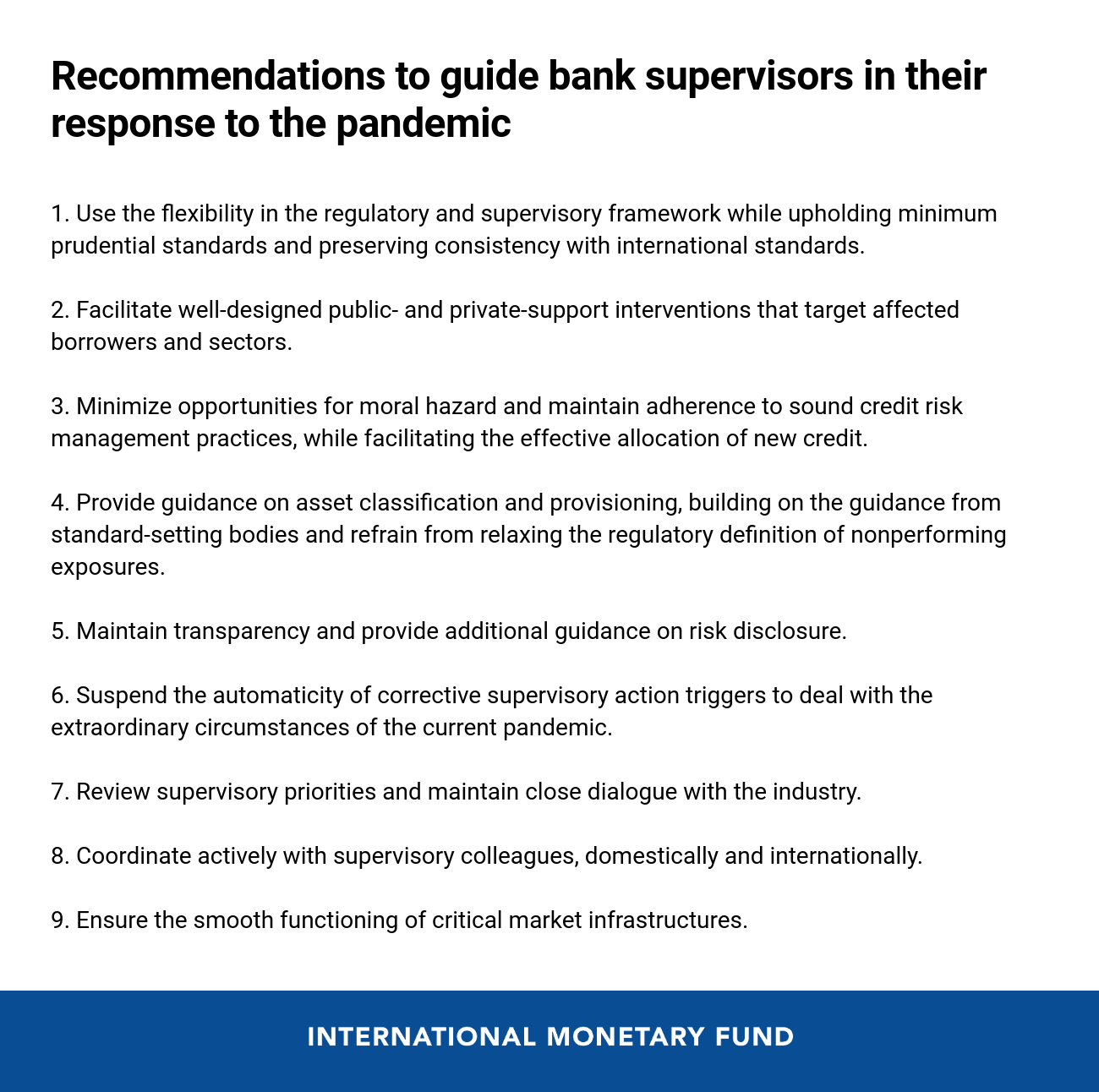By Tobias Adrian (IMF) and Ceyla Pazarbasioglu (World Bank)
The massive macro-financial shock caused by the pandemic continues to ravage the global economy and has put both banks and borrowers under severe strain. Supervisors find themselves confronted with unprecedented challenges which call for decisive action to ensure that banking systems support the real economy while preserving financial stability. This blog introduces nine joint International Monetary Fund – IMF-World Bank recommendations to help supervisors navigate these uncharted waters and calls for vigilance regarding policy measures taken that are not consistent with international standards. This is critical to prevent the health and economic crisis morphing into a financial crisis.
The banking sector plays a critical role in mitigating the unprecedented macroeconomic and financial shock caused by the pandemic through supporting affected borrowers and maintaining the flow of credit to the real sector while preserving financial stability. The global banking system is on a much stronger footing now than during the 2008 financial crisis due to the implementation of the G20 financial regulatory reforms. Still, as acute liquidity challenges give way to structural solvency problems, defaults on debt will rise and the pressure on the banking system will grow. Further adverse shocks to economic and financial conditions could realize. The lingering uncertainties about the ultimate length and impact of the shocks poses profound challenges to banking supervisors.
The IMF and the World Bank share a long-standing and key strategic partnership to help our member countries preserve financial sector stability and promote financial development. Our joint efforts are more important now than ever.
Banking supervision and regulation is an area in which both organizations have extensive experience. Drawing from insights of IMF-World Bank operations across our universal membership and our joint Financial Sector Assessment Program we have published a joint IMF-World Bank staff position note that sets out nine recommendations which can serve as a guide for banking supervisors to help navigate these uncharted waters.
What have policymakers done?
To provide immediate relief to affected borrowers and maintain adequate liquidity in the financial system, many national authorities have deployed support measures such as debt repayment postponement, stimulus packages, and credit guarantees.
Supervisors have been an integral part of this policy response. Building on the guidance of standard-setting bodies, many supervisory authorities have implemented a wide range of interventions in the financial sector. The measures target utilization of available bank capital and liquidity buffers, provide clarity on regulatory treatment, promote balance-sheet transparency, and maintain operational and business continuity of banks as well as payment systems.
What should supervisors bear in mind?
We provide nine recommendations that recognize the continued effort to support the immediate needs of the real economy, while ensuring financial stability. They encourage national authorities to employ the embedded flexibility of regulatory, supervisory, and accounting frameworks, while upholding internationally-agreed minimum regulatory standards and supervisory principles. Abandoning such principles could sow the seeds of future risks that potentially undermines the medium-term soundness and health of the banking system.
Particular vigilance is necessary regarding measures that are not consistent with internationally-agreed frameworks. Indeed, some developing countries have fewer policy options at their disposal due to limited policy buffers, weaker implementation capacity, and less-sophisticated regulatory frameworks. This could explain their higher reliance on policy responses that are not in line with our recommendations. These risk jeopardizing some of the hard-won gains in regulation and supervision in developing countries that underpin financial stability.
The role of the bank supervisor has never been so essential.
How do the recommendations help keep the financial system in good health?
If the blood pressure of a person increases, adjusting the medically-acceptable blood pressure range upwards may prevent a red alert on the hospital’s monitor, but it does not mean that the patient is not at risk. Similarly, changing the way in which the “vital signs” of the banking sector (capital, liquidity, asset quality) are defined and measured will not help to keep the banking system healthy.
For example, some jurisdictions have frozen the asset classification status and provisioning requirements for loans that were performing before the start of the pandemic or changed the definition of non-performing loans by extending the number of past-due days. This approach risks missing vital signs if part of the loan portfolio is structurally impacted and performance weakens. While temporary measures may help to buy time until a clearer view on the impact of the pandemic is possible, recommendation 4 calls for supervisory action to ensure that banks continue to monitor their asset quality using well-established standards and build adequate provisions over time. This approach ensures that the banks’ vital signs are properly measured, which facilitates management actions and prompts early supervisory actions if and when warranted. Providing clear guidance on asset classification and provisioning, ensuring that measures are well designed, time-bound, and targeted are also essential to lay the foundation for a sustainable recovery.
By encouraging the use of the flexibility in the framework, while upholding minimum standards, the recommendations seek to ensure that healthy vital signs of the banking system are transparently maintained and supervised. This will help to minimize the risks of a damaging financial crisis that would compound the major economic costs of the pandemic.
The IMF and the World Bank have taken a unified position to assist and support our member countries. These joint recommendations aid the development, monitoring, and strengthening of policies to sustain financial health during this pandemic and, equally important, for the road to recovery.
Tobias Adrian is the Financial Counsellor and Director of the IMF’s Monetary and Capital Markets Department. Ceyla Pazarbasioglu is Vice President for Equitable Growth, Finance and Institutions at the World Bank Group.






